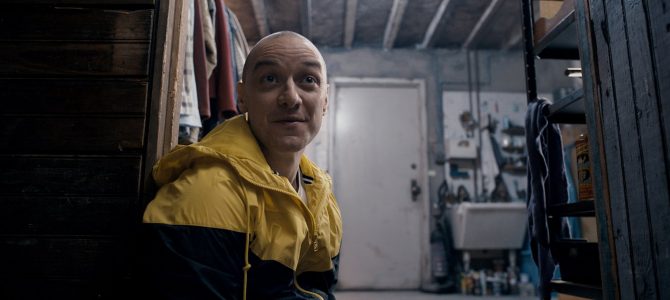
M. Night Shyamalan—a name that inspires fear in the hearts of moviegoers everywhere—is offering a new horror thriller called “Split.”
Perhaps I should clarify: Shyamalan’s name doesn’t inspire fear in the way Hitchcock’s does. It’s not that his movies are super scary: they’re usually super awful, a truth to which anyone who’s been unlucky enough to see one of his movies in the last 10 years can testify. Does anyone really want to sit through “Lady in the Water” again? Do you remember groaning at the end of “The Happening”? Did anyone even bother to see “The Last Airbender”?
After the huge flop of “After Earth,” I thought to myself, “Why are people still giving him money to make films with?” It seems that Hollywood came to the same conclusion, and Shyamalan had his allowance taken away.
Shyamalan supposedly made “Split” for less than a tenth of what it cost him to make “After Earth,” and you know what? It pretty much works. “Split’s” not perfect, but it’s good.
This Film Offers a Creepy Yet Powerful Story
Shyamalan is still Shyamalan, and all his movies, to a greater or lesser extent, suffer from his self-important style. But his trademark tight camerawork complements his script, by forcing the audience to focus on the idiosyncrasies of the human personality. Yes, the end of the film has a significant plot hole. But perhaps one could argue that every horror thriller needs a good plot hole. Working with a small budget again has forced Shyamalan back to what he’s good at: creative psychological storytelling unencumbered by special effects.
In “Split,” James McAvoy plays Kevin, a young man who suffers from Dissociative Identity Disorder. Kevin has 23 different personalities residing in his body. Twenty of the personalities are benign, but three are sinister. When the three sinister ones get the upper hand, they kidnap three girls, so they can have sacrificial victims ready for the emergence of a malevolent 24th personality. Let’s all say it together: That’s not how Dissociative Identity Disorder works. But it’s okay, because it’s just a movie.
“Split” is McAvoy’s movie, and his performance (should I say performances?) is wowing critics. Don’t worry about getting too confused, only eight different personalities manifest themselves in the film. I’ll admit that McAvoy deserves a great deal of credit for the film’s success, but I’m not going to pretend that this performance showcases the range of his acting ability.
‘Split’ Considers the Power Of Pain and Suffering
McAvoy might change his accent from personality to personality, but he stays consistently creepy. When he’s the no-nonsense “Dennis,” he’s just a creepy guy. When he’s nine-year-old “Hedwig,” he is just a creepy guy with a lisp. When he’s prim-and-proper “Patricia,” he is just a creepy guy in a skirt. I didn’t see a compelling and nuanced performance. I saw McAvoy convincingly portray one creepy guy who likes to play dress up. Even though McAvoy’s acting has been over-hyped, the movie’s pretty good, in a creepy way.
“Split” isn’t going to appeal to everyone. But fans of Shyamalan’s early work, especially “Unbreakable,” will enjoy it because he returns to some of the themes he’s explored successfully in the past. In Shyamalan’s world, pain and suffering can unlock our true potential and bring about greatness.
Honestly, the characters’ dialogue on this theme can get a bit tiresome, but it’s a thought-provoking idea. The audience is confronted with the question of how one achieves perfection. To what extent does life conform to Darwin’s idea that the trials of our environment propel an evolutionary process? Or to what extent do our trials have a more transcendent purpose? Do our scars save us, and what does it mean to be saved in the first place?
We Can Become What We Believe We Are
Another idea that Shyamalan offers in “Split” is that we can become whatever we believe we are. Given America’s recent kerfuffle over bathroom rights, this question “Can we become whatever we believe?” seems a particularly relevant one. Shyamalan answers the question with a “yes.” Our human minds are more powerful than our bodies, and unlocking the potential of our minds is the key to progress. The body must follow wherever the mind leads. But before the left-leaning existentialists begin to rejoice too loudly, let me point out that “Split” is also a cautionary tale.
Just because you can become anything you believe, this doesn’t mean that everything you believe is right. If you believe wrong things, you will become that which is wrong. The personalities in Kevin’s mind believe they can become “the Beast” without thinking about whether they should become “the Beast.” Kevin becomes Nietzsche’s übermensch, whose ability to act justifies his actions.
Kevin’s therapist feels sympathy for him but celebrates his illness. She believes that maybe Dissociative Identity Disorder makes Kevin a better Kevin, but the audience knows that he’s just creepy. Our society has plenty of people who, like Kevin’s therapist, celebrate attempts to transcend our humanness, but once we deny our human finitude, we might become demons rather than angels.
Overall, the movie exhibits a fairly conservative worldview. Suffering refines us, but it doesn’t necessarily expose a heart of gold. Suffering might drive some people to seek power, but the suffering cannot justify their actions once they’ve attained that power. Humans have freedom to act, but acting contrary to our nature brings evil. And perhaps the most important lesson of “Split” is that faith matters. If we put our faith in the wrong thing, we will become monsters.









